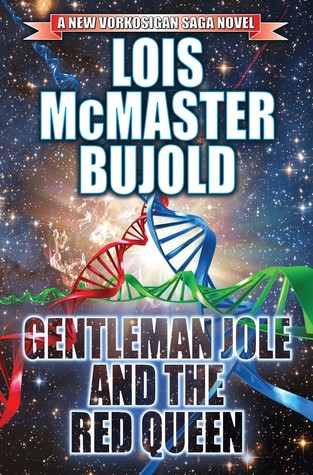
If you're already a fan of Lois McMaster Bujold's award-winning Vorkosigan Saga novels, then this month's release of Gentleman Jole and the Red Queen will bring much rejoicing. If you're new to the series, this novel is an excellent excuse to start reading. It's one of the most realistic and funny novels you'll ever read about space colonization. Somehow it manages to be gripping, despite its focus on balancing military budgets, dealing with defense contractors, and the weirdness of long-term marriage.
Mild spoilers for the Vorkosigan Saga follow.
Meet the Vorkosigans
Bujold began her galaxy-spanning series in the 1980s with a pair of novels, Shards of Honor and Barrayar, about a young starship captain named Cordelia Naismith from the planet Beta. A peaceful, politically progressive planet—basically, Copenhagen in space—Beta sends out scientist-explorers like Cordelia to gather data for its exoplanetary "geological survey." While studying a supposedly uninhabited planet, Cordelia meets the military officer Aral Vorkosigan, from the patriarchal, conservative planet Barrayar, where women tend to be housewives and men destroy themselves on the battlefield. Against all odds, and in the midst of a deadly war, the two fall in love.
As a result, Cordelia brings her planet's greatest technology to Barrayar, an artificial womb called a "uterine replicator." She brings her Betan values, too, which delights the forward-thinking Aral and pisses off a lot of the other ruling men on the planet. Of course, Cordelia manages to save the day at the end of Barrayar—and save her unborn son Miles, too, though her enemies have managed to tamper with his replicator, leaving him with congenital disabilities.
Barrayar won the Hugo Award in 1991, but Bujold made the unusual choice to continue the series by jumping forward roughly two decades to focus on Miles Vorkosigan, the only child of Aral and Cordelia. Most of the novels in the series, with a few exceptions like the superb standalone Ethan of Athos, are about Miles' career as a galactic fixer. An incredible genius whose disabilities bar him from active military duty, he becomes a kind of military Sherlock, solving weird problems and saving more than one world from destruction. He never strays far from family entanglements, though. Aral and Cordelia appear occasionally in the novels, as does a growing roster of other family members, from clones and children to Cordelia's godson—who happens to rule Barrayar.
Always witty and masterfully plotted, the Vorkosigan Saga novels chart the rise of a powerful family whose members are enlightened and humane—though not above breaking the law or bargaining with shady characters when necessary. Through over a dozen books and many more short stories, the series has had lasting appeal because it doesn't shy away from the complexity of political engagement, whether that's in wars over wormholes or in the halls of a sketchy cryogenic storage clinic. Bujold never forgets about the personal realm, either, giving us characters whose lives definitely remind us that soap opera and space opera have more in common than the word "opera."
Cordelia's back, baby (and baby and baby and baby and baby...)
Now, with Gentleman Jole and the Red Queen, Bujold returns to Cordelia's story—over forty years after the events of Barrayar. Aral has died unexpectedly three years before, and Cordelia has returned to the planet where they met, now dubbed Sergyar. As the high-ranking Vicereine, she oversees colonization on Sergyar, dealing with a parade of irritating contractors, laborers, and would-be politicians who are building the planet's first major city. Still coping with the loss of her husband, Cordelia has nevertheless whipped the colonists into shape, forcing them to relocate their glorified encampment at the base of a simmering volcano in the desert to a more congenial location on the coast.

But she has another piece of unfinished family business, too. Admiral Oliver Jole, who runs Sergyar's fleet from orbit, is still on her mind. Just a few pages into the novel, we discover that Cordelia and Aral were up to a lot more than running Barrayar while Miles was traipsing around the galaxy. Twenty years ago, Aral and Oliver fell in love. We've known that Aral was bisexual throughout the series, but it was always something from his fairly distant past. Turns out that Aral, Oliver, and Cordelia formed an unconventional kind of marriage for two decades, an open secret among their closest colleagues, but still forbidden by the social norms of Barrayar. So yeah, that happened.
This is exactly the kind of strange scenario that Bujold loves to sink her teeth into. How do two spouses mourn the loss of their shared husband? And what should they do with his leftover genetic material, in a future where the technology exists to create a child from the genetic material of two men?
Just as important are Oliver and Cordelia's professional problems. They have an entire planet to run and a city to build. First they have to figure out what the hell to do with a delivery of spoiled plascrete, sold to them by a defense contractor who doesn't mind ripping off the military. And then there are the planet's bizarre animals, many of whom suck blood or explode or both. On top of that, everybody needs money or supplies or labor. Somehow Cordelia and Oliver have to help their reports and constituents do more with less.
A truly futuristic marriage
The centerpiece of the novel is Cordelia and Oliver's growing affection for each other, without the powerful gravitational pull exerted by Aral. It's testimony to Bujold's power as a science fiction writer that she doesn't just hint at the futuristic threesome and then skip right to a more conventional romance between Cordelia and Oliver. She shows us, in flashbacks, how a three-person marriage would work, complete with mundane scheduling, trust issues, and (of course) the occasional crazy night of group sex.
Making things more complicated is the fact that both homosexuality and open relationships are frowned upon among Barrayarans. Though Betans have special earrings to signal multiple commitments, on Barrayar, not so much. Aral risks everything to bring Oliver into his marriage. Now that he's gone, Cordelia and Oliver have to overcome habits of secrecy from their threesome—while still protecting their privacy as powerful public figures on Sergyar.
Bujold manages to make Cordelia and Oliver's complicated relationship into its own form of futuristic exploration. This becomes even more obvious as the two contemplate whether they should actually have children with Aral. Their babies will be among the first humans reared on Sergyar; we may be about to witness a new planetary culture being born out of a three-person marriage.
That said, there are many elements of Oliver and Cordelia's relationship that will be recognizable to anyone dealing with second marriages and middle age. Every decision the two make is tinged with the melancholy realization that it's time to live now, because nobody is getting any younger. Plus, there are the already-existing children to think about. What will Miles say when he finds out?
Bujold's light but wise storytelling makes this odd tale of bureaucratic shenanigans and autumnal romance into a coming-of-age story for people who grew up a long time ago.
For people who haven't read the series, it's an excellent way in—certainly it can be read on its own, but I would recommend wolfing down the two (short) Cordelia novels first. They're sold together as a paperback called Cordelia's Honor, or you can pick them up as e-books. Of course, you might find that you need to read (or re-read) the Miles novels, too.
In some ways, Gentleman Jole and the Red Queen reads like Bujold is bringing the series to a close. But it's also a quickening, a fresh take on an epic saga whose author clearly has a lot more stories to tell. That's why it's a great place to enter the Vorkosigan Saga, as well as an unexpected delight for people who have been there all along.
reader comments
86